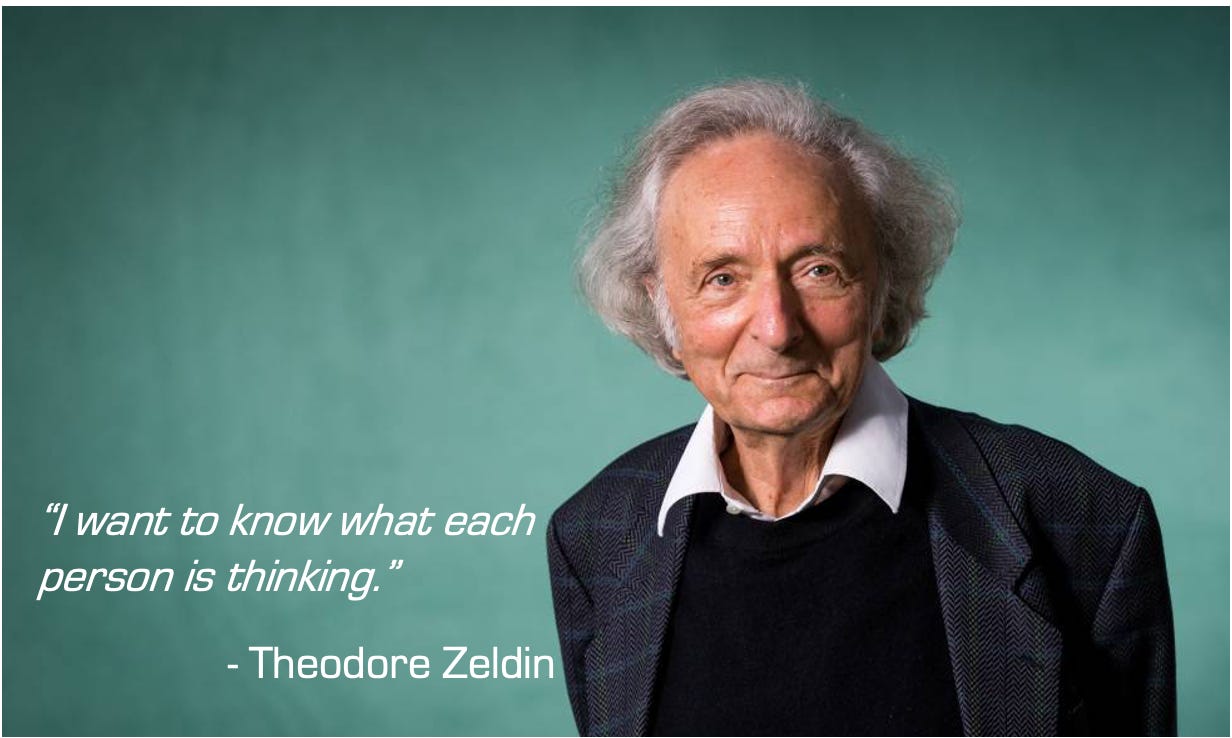We're not powerless
Theodore Zeldin—when we talk to each other we discover who we are, that each person counts, and we can change the way we work.
Amazon says that if you but this one thing, you’ll buy this other thing.
But it doesn’t know you.
Perhaps then, to know and be known we can escape in the past.
In the Renaissance, it was possible to know all there was to know. Now it’s impossible with the vast amount of knowledge. Our jobs also require that we become experts at one particular thing. Thus our minds have become more narrow.
Then we thought we might follow the Enlightenment. Which said that if you use your reason, you will get rid of your superstitions and all will be well. We’ll establish good societies. We can no longer believe that.
And so we might say, let’s be Romantics, instead. Let’s rely on our feelings and fall in love freely. Even though that brings disasters, we can continue trying again. Which means we’ve gone beyond saying ‘let us belong to something.’
To belong to something may be going out of fashion. How many of you feel you belong to a nation—that you’re happy to live in this nation without ever going out of it.
To read only the literature of this nation, without acquiring knowledge of all the literature outside it. How many nations can you love apart from your own?
It seems that the more you’re educated, the more you want to go beyond this offer of ‘one belonging.’
The results of economics and politics, as you can see is that we’ve become richer. But as you also know it’s only a fraction of the population that enjoys the perks. If we look at whether the promises of politics get fulfilled, it’s very unclear that they do.
Other options
You might say that you belong to your Religion. Most of the world is religious. It’s only in the Western part of the world that religion seems to have declined. If you look at the history of religions, you’ll see that they’ve changed enormously over centuries.
In the 18th century, most religions said that as long as you behaved ethically and morally, it didn’t matter what religion you belonged to. Though there have been times when you’d be executed if you believed in a particular dogma.
Several years ago, the Church of England put its belief in management theory. The new Archbishop has said that 36 Bishops would be sent to study management like MBAs. So they can run the church, which has about 1 million people going to it.
Other clerics protested—what about the ritual content of religion, have you forgotten about spirituality, is efficiency all that matters? There’s so much disagreement that we’ve got to find another way.
It’s not good asking people—What is your religion?
Instead ask—How do you put your religion into practice?
We could say we’ve come to rely on Therapy. What’s interesting is that we ask how to cope with depression, rather than how not to have depression at all.
What shall we do with our lives? Is an open question.
However, life becomes much more interesting when we aim to know others.
How we discover who we are
“What I want from life is to discover what life is.” Acclaimed philosopher and historian Theodore Zeldin has engaged in a lifetime of philosophical study in search of what a full and flourishing life could be.
He says that our relationships with others is both the greatest problem and the greatest opportunity of the twenty-first century. “Interactions between people are the crucial motor of change.”
Our society is full of untapped potential for richer, more creative human interactions. By relating to others we can learn to emerge from established patterns of thought and behavior and experience a fuller life.
You can discover what life is by talking to as many people as possible—to see life differently than you do. Curiosity was dangerous in the past. Perhaps it’s becoming dangerous again. but we still have the ability to meet.
What kind of meeting is this Zeldin proposes? One that can be life-affirming. One that can get you closer to understanding and appreciation. One that can lead to affection, after which you feel alive.
Talking from a podium is the opposite of the kind of meeting we want. And so is getting on a room full of people around a table. Or on one of those Zoom calls with all those faces, you’ve seen those everywhere recently.
These meetings have a place. But they’re not useful for the kind of learning we need.
Keep reading with a 7-day free trial
Subscribe to On Value in Culture with Valeria Maltoni to keep reading this post and get 7 days of free access to the full post archives.





